
Age is just a number
You may not be able to turn back time, but you can alter the effects of time on your body. It really is possible to slow physical and mental aging. Research has shown that people the same chronological age may have a different “biological age.”
In one study published in the journal PNAS, nearly 1,000 participants of the same age were examined for cognitive abilities, cardiovascular health, and other markers of fitness at three different ages: 26, 32, and 38. The researchers plotted the slope of each individual’s biomarkers and discovered that they didn’t all decline at the same rate. Some, in fact, had no slope at all, meaning they weren’t aging. At 38 years old, these volunteers had biological ages that ranged anywhere from younger than 30 to nearly 60 years old.
What this means for you is that factors other than genetics can influence the rate you’ll age, the study authors said in a Duke University press release. Many of these are within your control, so read on to find out how to slow your pace of aging.
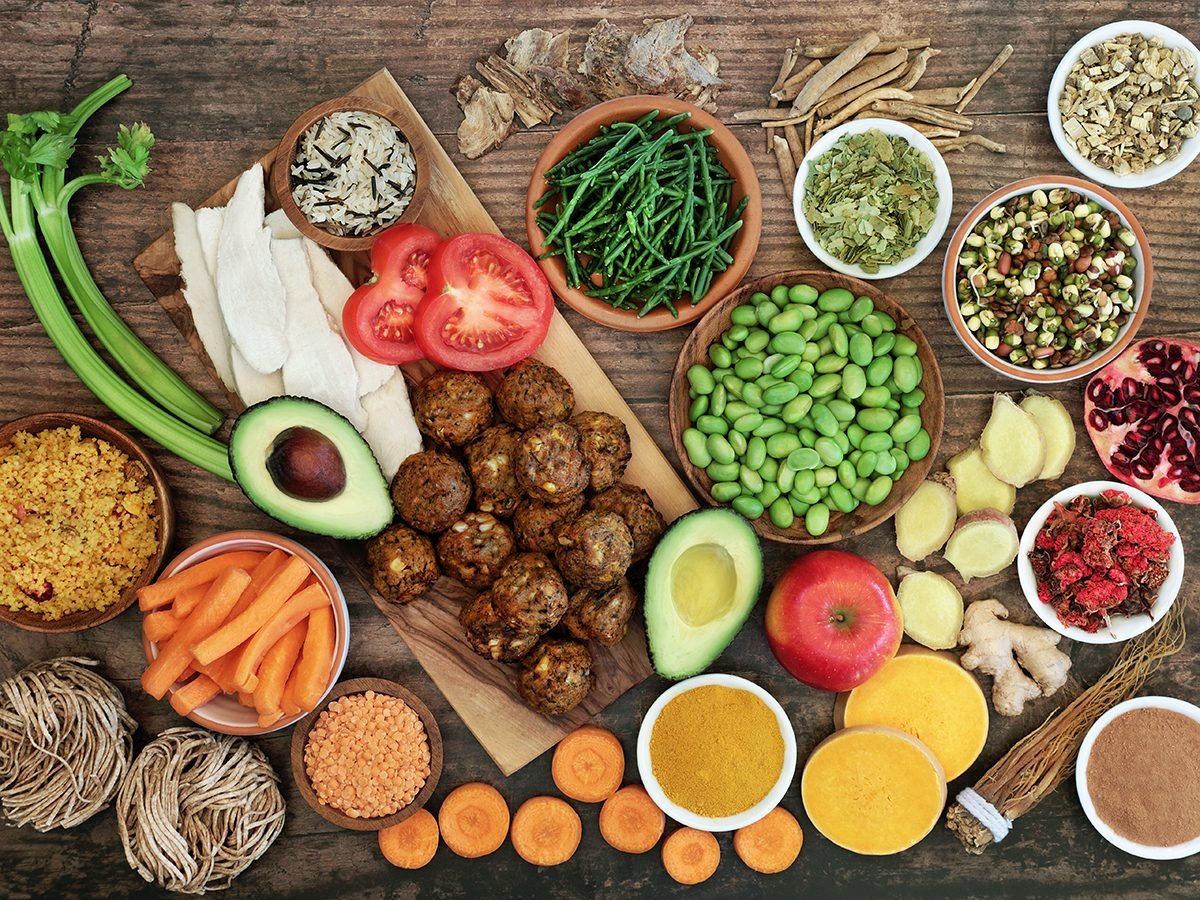
Whole foods
Experts agree the best diet for preventing age-related damage and disease starts with whole, natural foods. “A healthy diet includes fewer processed foods without added sugars, fats, and salt,” says Benjamin Epstein, MD, a family medicine specialist with Piedmont Physicians. Avoiding unhealthy sugar and fats can help prevent inflammation, diabetes, and heart disease.
Epstein recommends “whole grains, such as whole wheat and brown rice; lean meats and fish, poultry, and eggs; beans, peas, and legumes; and five or more servings of fruits and vegetables a day.” Studies reveal that eating whole foods boosts your body’s supply of nutrients that keep cells healthy, reduce inflammation, and reduce the risk of major chronic diseases associated with age.
Other research has found that proper nutrients also help keep the brain functioning better longer. “Like so many aspects of our body, what we eat also affects the mind,” says Jyotir Jani, MD, primary care physician with Piedmont Healthcare. “Eating food that is natural, home-cooked with love, and limiting red meat help keep the brain sharper.”
Start your days right with these healthy breakfast ideas!
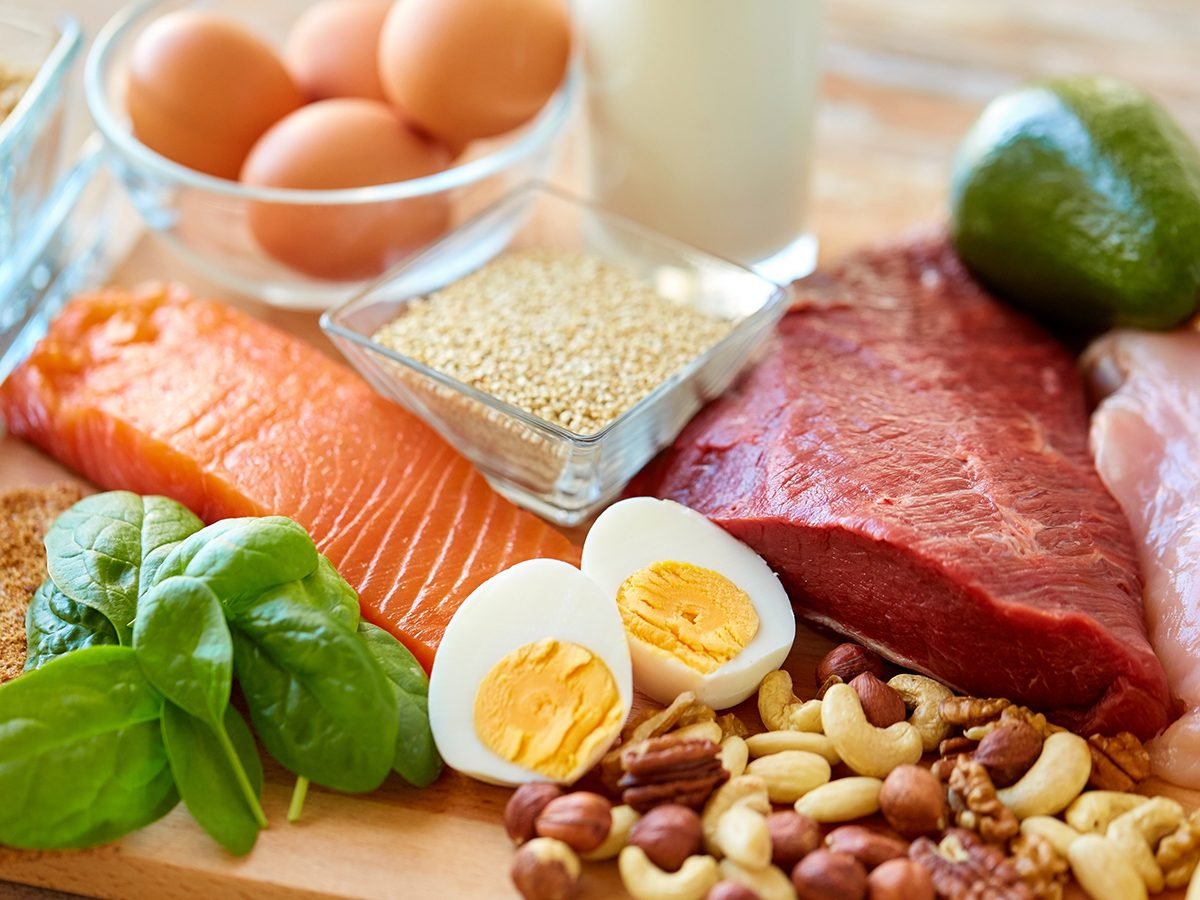
Getting enough protein
Eating healthily shouldn’t mean missing out on protein. Studies show protein is especially important in maintaining muscle mass as we age. “People over the age of 40 may lose up to eight per cent of their muscle mass per decade, and the rate of decline may double after the age of 70,” says Abby Sauer, MPH, RD, a registered dietitian with Abbott. “Yet a recently published study from researchers at Abbott and The Ohio State University found that more than one in three Americans over 50 aren’t getting the recommended amount of protein.”
She recommends adults snack on protein sources like nuts, Greek yogurt, or string cheese. Also, “add protein-toppers to meals, such as hummus to a turkey sandwich, diced chicken to pasta, or beans to salad, and aim to eat 25 to 30 grams of protein at every meal,” she says.
Learn to spot the signs you could be eating too much protein.

Being outdoors
Vitamin D, the “sunshine vitamin,” helps keep your bones strong, and it may also help protect against age-related conditions like heart disease and cancer. According to a study of more than 2,000 women, those with higher vitamin D levels also had longer telomeres, the caps on the ends of DNA cells that determine a cell’s lifespan. Another study found that older adults with low vitamin D levels had a harder time with everyday tasks like walking up stairs, dressing, and even cutting their toenails.
“Getting 15 to 30 minutes of sun exposure a day should be adequate for vitamin D production,” says Jani. “Of course, that is not through sunbathing but by being outside with normal clothing.” You can also get vitamin D in foods, such as fatty fish like salmon, egg yolks, and fortified foods including cereals.
Here are the signs that could mean you’re not getting enough vitamin D.

Staying hydrated
As you get older, your kidneys work less efficiently, you may not be as sensitive to thirst signals, and you may take medications that lower your body’s fluids. Altogether, this helps explain why the elderly are more prone to dehydration. In a vicious cycle, dehydration derails the normal function of vital systems in your body and even cause dementia-like confusion.
Because of these risks, “it’s especially important to stay hydrated as we age,” Sauer says. “Water is critical as it makes up about 60 per cent of adults’ body weight, and our bodies need water for important functions such as regulating body temperature, maintaining healthy skin and joints, digesting food, and removing waste.” To keep these systems working better longer, drink even if you aren’t thirsty, and consume foods with high water content, such as fruits, vegetables, and soups, she says.
These are the signs your body is aging faster than you are.

Maintaining your teeth
It’s starting to look like there’s a connection between a healthy mouth and healthy aging. Research has shown poor dental health is linked to age-related problems such as cardiovascular disease, stroke, and diabetes, possibly because bacteria from oral infections may get into the blood and increase inflammation in other parts of the body. In addition, recent studies indicate that gum disease may be linked to a higher risk of dementia and Alzheimer’s. Although these connections are still under study, it’s worth keeping your chompers healthy and possibly preventing these age-related diseases with good dental habits.
Make sure you’re not making these common teeth-cleaning mistakes.
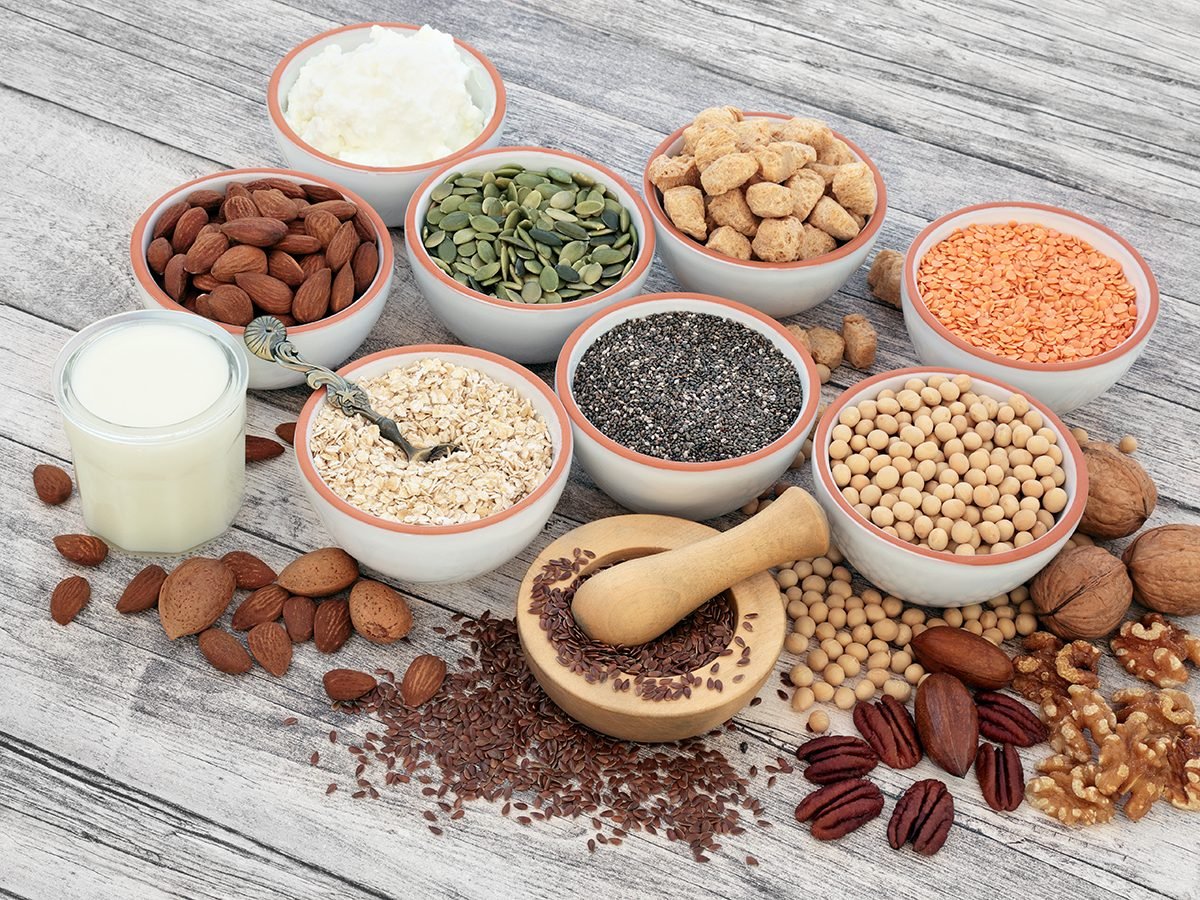
Keeping your gut healthy
Research has found the collection of “good” bacteria in your intestines, called the gut microbiome, may have implications for how your body ages. It may even protect you from some age-related diseases such as dementia. In one study published in the journal Cell, the presence of certain gut bacteria actually slowed the rate of aging in worms, which may lead to anti-aging bacterial treatments for humans in the future.
“About 70 per cent of your immune system resides in your gut, so maintaining gut health as you age is important to your overall health,” Sauer says. “Among other things, your gut provides protection from infections, regulates metabolism, supports your immune system, and promotes a healthy gastrointestinal function.” To encourage healthy gut flora as you age, Sauer recommends choosing prebiotic and probiotic foods such as fibre-rich fruits, vegetables, kefir, yogurt, sauerkraut, and kimchi. Exercise, fibre and fluids can also help keep things moving through your digestive tract.
Check out these painless ways to increase dietary fibre.
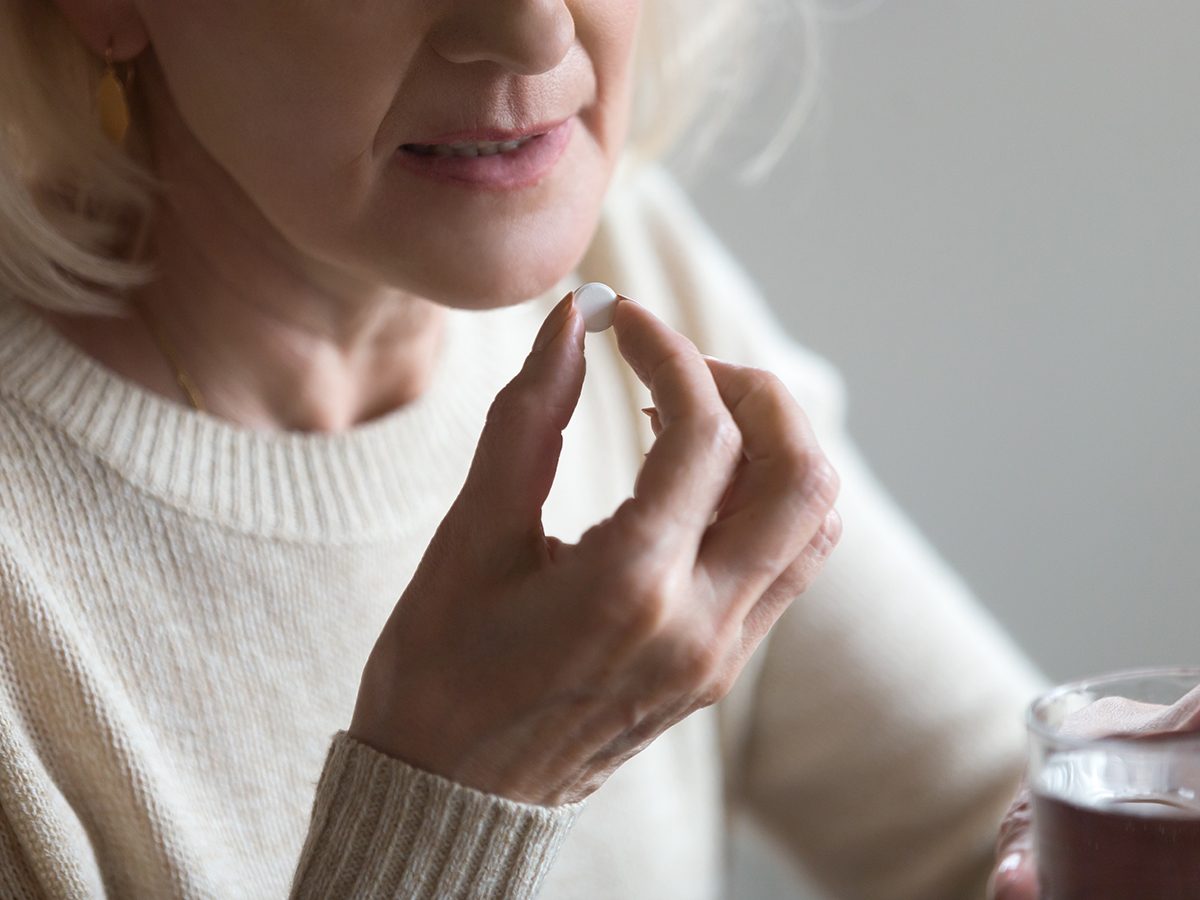
Healthy digestion
Because older people, especially those who are overweight, are prone to acid reflux, you may think of your stomach acid as the enemy. But you need a healthy supply of digestive acids to absorb vital vitamin B12—it helps keep your brain sharp. Atrophic gastritis, which affects 10 to 30 per cent of older adults, reduces stomach acid, and therefore absorption of B12. “Deficiency in vitamin B12 can contribute to decreased cognitive function,” Epstein says. In addition, “acid-reducing medicines, and medicines like Metformin for diabetes, can decrease the absorption of nutrients such as vitamin B12.”
To prevent this, supplements and fortified foods may be necessary. You can also get B12 from fish, eggs, poultry, and dairy products. “Again, this shows the importance of a diet high in nutrients without being high in calories, not only as we age, but throughout our lives,” Epstein says.
Are you getting enough of the essential vitamins your body needs to stay healthy?

Reducing stress
Chronic stress causes a lot of problems, from wrecking your sleep to increasing your risk of heart disease. In a landmark study published in PNAS, stress was shown to shorten telomeres, the DNA protective caps that help keep cells thriving. People with the highest stress levels had shorter telomeres. It was as if these people were a decade older than people in the lowest stress category, say the study authors.
But the good news is that you can lengthen your telomeres by reducing your stress. In one study, women who practiced meditation had longer telomeres than those who didn’t. Meditation may help focus the mind, which is also associated with better cognitive functioning. “Increased stress makes us distracted, frustrated, and unable to focus,” Jani says. “Regular meditation that focuses on breathing or spirituality for 15 minutes per day can have profound effects on improving the concentration ability of the mind.”
Make sure you’re not ignoring these subtle signs of stress.

Sleep
It’s called beauty sleep for a reason. When you’re snoozing, your body gets busy repairing cell damage. If you cut your sleep short, you can accelerate the visible and internal signs of aging. As if bags and wrinkles under the eyes weren’t enough evidence of this, studies have confirmed that poor sleep ages skin faster. In addition, poor or inadequate sleep is linked to age-related diseases like heart problems, high blood pressure, and diabetes, reports the Centers for Disease Control and Prevention.
Sleep deprivation can also undermine your brain as you age—and many older adults suffer from insomnia. To get the recommended seven to nine hours of sleep a night, create a calming bedtime routine, reduce lighting and screen time before bed, and don’t eat or drink caffeine close to bedtime. Also, talk to your doctor if you snore a lot, or think your insomnia may be due to medications or other health conditions.
Check out the best sleeping positions for a good night’s rest.
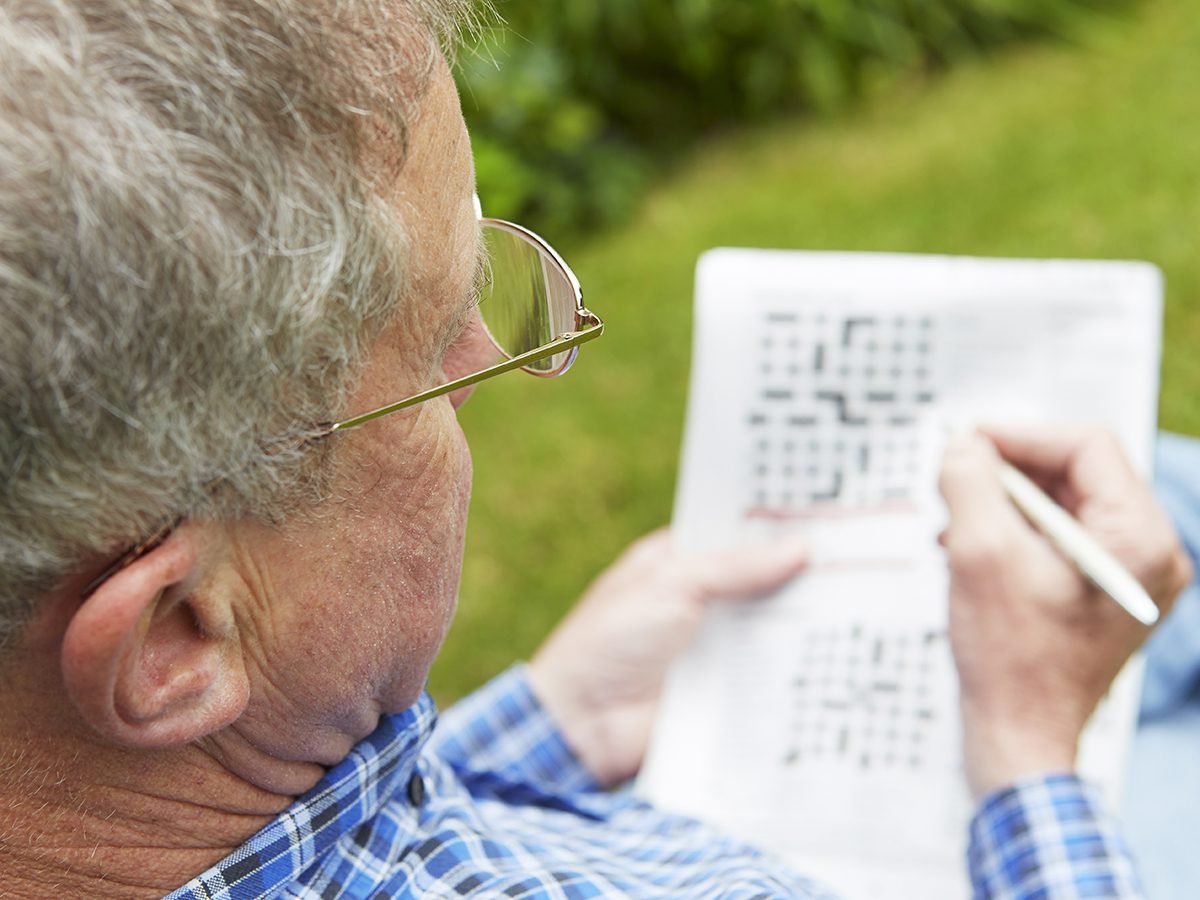
An active brain
Numerous studies indicate that you may be able to lower the risk—or delay the onset—of age-related mental conditions like dementia and Alzheimer’s if you have “cognitive reserve“—resilient brain networks that keep working even if other parts of the brain suffer damage. You can build up this reserve by staying actively engaged in learning new skills and continuing to socialize throughout your life.
“The best ways to keep your brain active and sharp is practicing activity that focuses the mind,” Jani says. “In addition, constantly learning new things or expanding one’s knowledge in the profession that they may be in also helps tremendously.” For example, research shows learning complex skills like digital photography or quilting enhances memory and cognitive function in older adults.
Don’t miss these simple ways to boost your brain power!

Having a positive attitude
The old saying is true: You’re only as old as you feel. Research backs up the benefits of staying young at heart. Having a positive attitude about aging, maintaining a purpose, and staying socially engaged may help slow the physical and mental aging process. One study revealed that people with a positive attitude lived 7.5 years longer than pessimists, regardless of health. Another found that negative thinking led to steeper physical and cognitive declines.
Yet another study showed those that glass-half-full types were less likely to develop dementia, even if they had a high risk for the disease. “Maintaining a positive attitude and remaining connected socially not only helps us prevent depression, but also helps us better cope with health conditions, and even live longer,”Epstein says.
Next, check out these expert-approved secrets to a happier life!